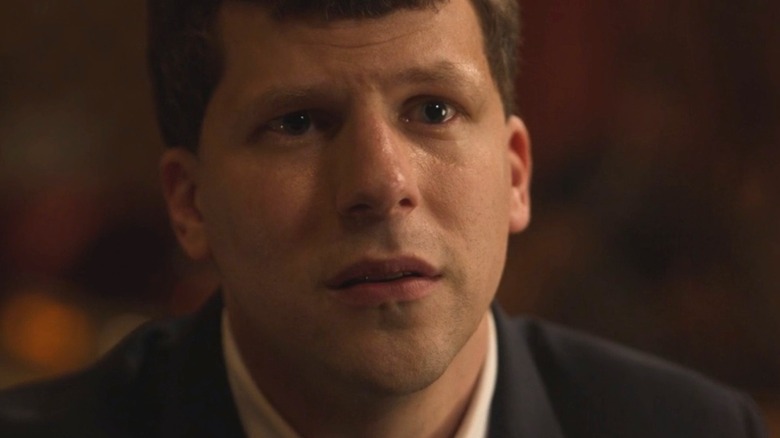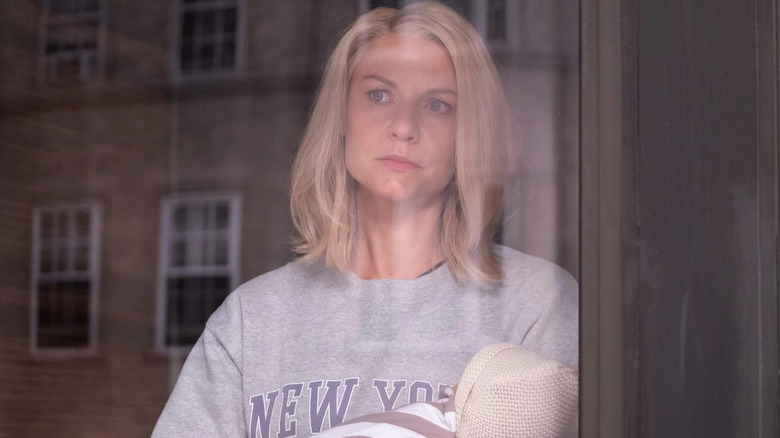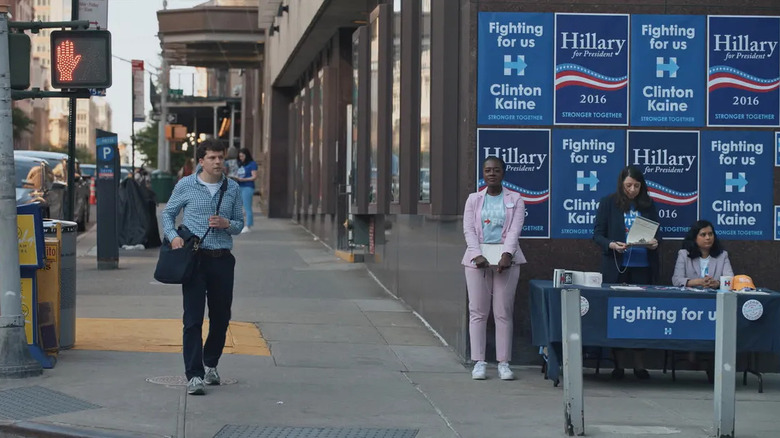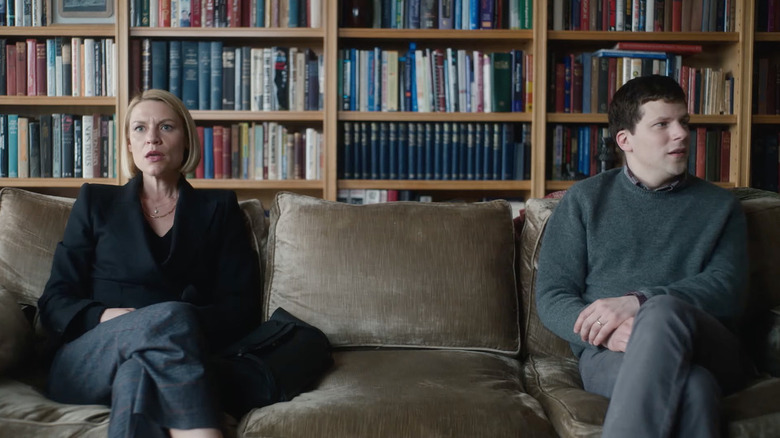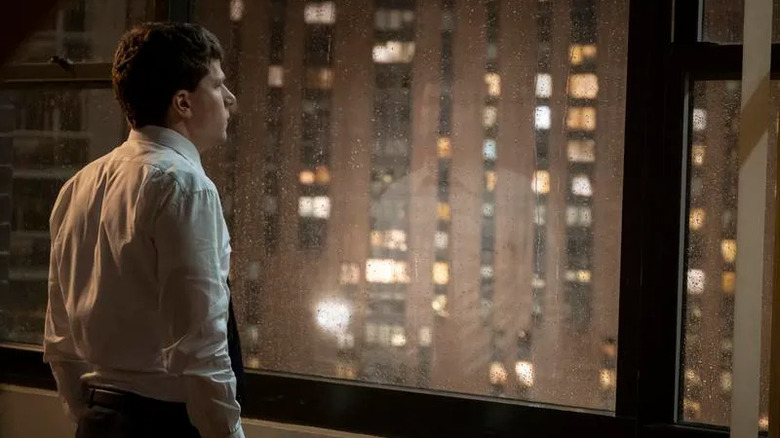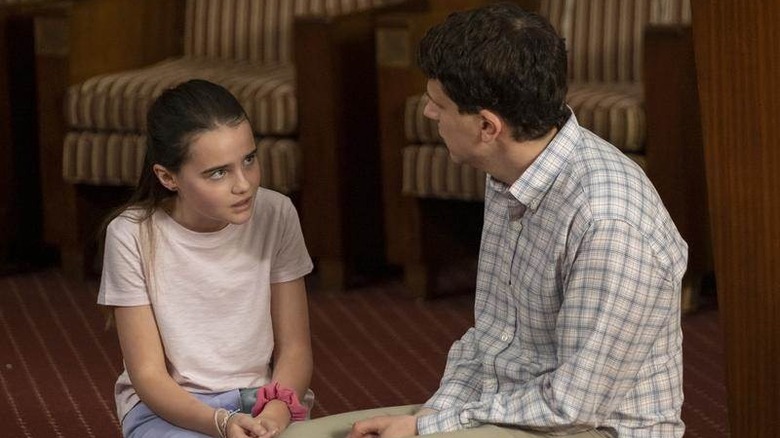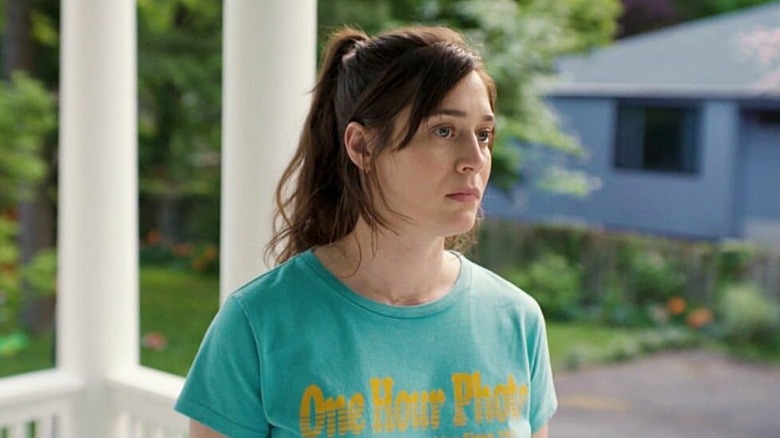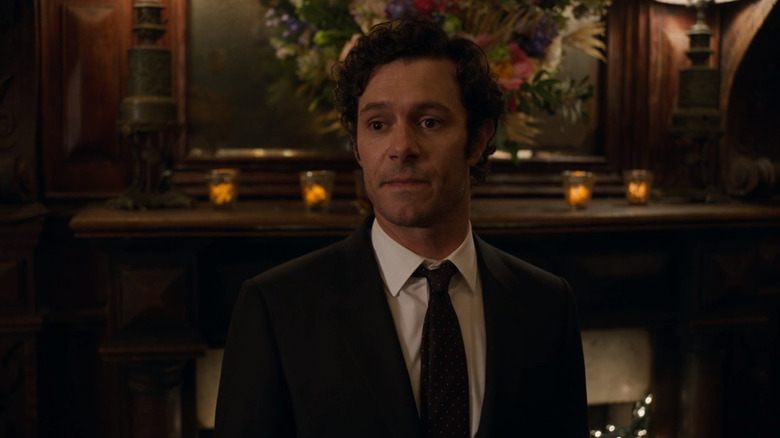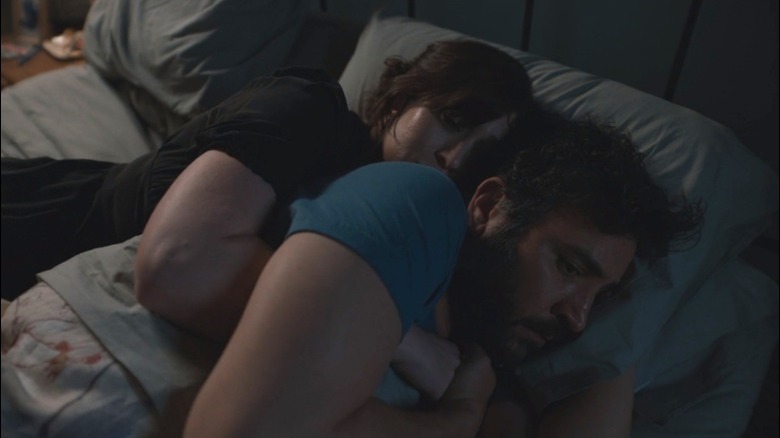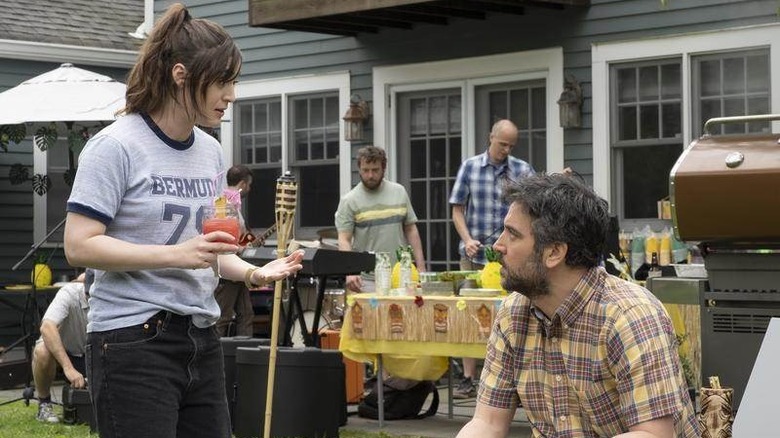The Ending Of Fleishman Is In Trouble Explained
We may receive a commission on purchases made from links.
"Fleishman Is In Trouble" — all eight episodes of which are now available on FX on Hulu — is a miniseries based on Taffy Brodesser-Akner's 2019 novel of the same name. On screen, the story maintains many of the hallmarks that made the book a New York Times Bestseller. It's heavily narrated by Libby (Lizzy Caplan), who, at first, seems like a supporting character, and its central mystery packs less of a plot punch and more of an emotional wallop.
We meet 40-something Toby Fleishman (Jesse Eisenberg) shortly after he's gotten divorced as he struggles to figure out co-parenting and online dating. But before the end of the first episode ("Summon Your Witnesses"), his ex-wife, Rachel (Claire Danes), has gone missing. Toby, who's a sought-after hepatologist on track for a promotion, is too caught up in his own unwieldy life and his self-righteous anger at Rachel to worry.
As he tries to process everything that's gone wrong, he reaches out to old friends, Libby and Seth (Adam Brody). Because the characters in "Fleishman Is In Trouble" are so verbose, by the time the finale comes around, we know how everybody feels and why they all behave as they do. But their revelations about love, life, and everything else (as Libby puts it) are still worth dissecting and pondering, even for those of us who don't make "a mill" and have a second home in Vale.
Rachel is in trouble
"Fleishman Is In Trouble" doesn't have any the-butler-did-it style twists. Instead, it forces the viewer to adopt another perspective. One of its two major shifts comes in Episode 7 ("Me-Time") when the audience learns that Rachel is doing way worse than anyone — including Toby. Until this episode, Rachel had been depicted as the villain, but when Libby runs into Rachel, who's been AWOL for weeks, she remembers an important lesson from her magazine writing days — there's always another side to the story.
In flashbacks, we see that Rachel's icy, hyper-confident persona is exactly that; a mask she wears to hide the fact that she's really a middle-class nobody in need of affirmation. Her trauma began when she lost her parents and worsened when a botched birthing plan left her with severe postpartum depression. She isn't blameless in the dissolution of her marriage, but when we see Rachel as a whole person and not just from Toby's oversimplified vantage point, it's much easier to have sympathy for her. In fact, it becomes clear Toby wasn't adequately there for her when she needed him.
Her fling with Sam Rothberg (Josh Stamberg) is merely a distraction from her mental illness. Their wellness retreat weekend propels her into a full nervous breakdown, during which time she loses weeks of her life to mania, not to mention her career. The immediate fallout is devastating, but thanks to Libby, Rachel is about to get the help she needs and deserves.
The election as a backdrop
"Fleishman Is In Trouble" is set in the summer of 2016 leading up to the presidential election. That's no accident, as the show analyzes the way class and gender tensions dictate our lives. Campaign signs are peppered throughout the episodes and characters guardedly discuss who they'll vote for and why. Toby assumes the women in their social circle think Donald Trump is a joke and support Hillary Clinton, but one shrugs and offers that at least with "him" they'll get to keep their money. So as not to make the election too integral a part of the plot, the candidates' names are rarely mentioned.
The class tension between Toby and Rachel is highlighted as a major reason for their split. From his perspective, enough was never enough. He resented how hard she tried to fit into high society, how she pushed him to be more ambitious, and how she tried to network even their kids' social lives. From her perspective, we see how much working-class economic anxiety and how much imposter syndrome she has. But both Fleishmans are progressive working professionals in a sea of one-percenter WASPy trust fund babies and stay-at-home moms.
Characters also frequently cite reasons they don't like Clinton. Sometimes it's something specific, like her voice, but other times, they can't put their finger on it. This is all foreshadowing for the series' empathetic turn toward Rachel, who shares many of the democratic nominee's physical and personality traits.
The oxygen mask as a metaphor
When Rachel first tries to befriend the upper-crust moms, they tell her that she's working too hard and that she needs to take some time for herself. Mrs. Rothberg (Jenny Powers), uses the metaphor of an oxygen mask falling from the ceiling of an airplane during a crash landing. In the finale, Libby repeats this same idea to Toby in an attempt to convince him that Rachel really is suffering. The thinking goes, if a plane is taking a nosedive, a person should tend to their own mask before assisting others with theirs. Libby says Rachel was simply putting on her own oxygen mask, but Toby — who's still too wounded to give Rachel the benefit of the doubt — rejects this notion.
The oxygen mask metaphor is a fitting one for "Fleishman Is In Trouble," which is constantly in debate with itself about the rights and responsibilities of the individual in any relationship or family unit. At the start, Toby is trying to find himself again. He's torn between potential app matches, his boss, his kids, and their babysitter. When he chooses himself, his family pays the price — Hanna (Meara Mahoney Gross) misses social events and Solly (Maxim Jasper Swinton) gets freaked out when he discovers porn unattended. When he chooses his family, his patients and his career pay the price. In Episodes 7 and 8, we see that Rachel and Libby face similarly impossible conundrums every day, as do we all.
Toby begins to heal
Though Toby is occasionally excited by the unknown, things aren't going well for him. He feels emasculated by Rothberg, and like a screw-up as a parent. He missed out on his promotion because he prioritized his in-crisis family and all the women who seemed so interested only weeks before have turned into dating dead ends. But it's his callous reaction to Libby when she shows up at his apartment to tell him about Rachel that causes Toby to do some more honest soul-searching.
Throughout the series, he thinks of himself as the less material, more altruistic party in the marriage and ultimately the victim of Rachel's greed and selfishness. But as he comforts the husband of a patient he lost, he admits to himself that maybe he's too quick to blame others for his mistakes and that maybe there's a meanness to him that's always been there.
A more together and introspective Toby helps Solly practice his science project presentation and helps Hanna practice for her meeting with the Rabbi. He finally takes the kids back to the Natural History Museum to face the Vantablack before the exhibit closes. This symbolic act represents the fact that Toby and his kids have been through the worst of it and have come out the other side, if not stronger then at least okay. But for Toby, the worst of it wasn't Rachel abandoning them; it was facing his own demons without her there to play the bad guy.
Divorce is a chronic condition for kids
In the finale, Toby comes to the conclusion that divorce is an earthquake for the two people in the marriage that's ending, but it's a chronic condition for the kids involved. Just as Rachel had to grow up too soon in the wake of her mother's death, and just as the emotional scars of that did and continue to affect her, so too will the scars that Hanna and Solly bear because of their parents fighting and eventual breakup. Rather than have pity for himself, Toby steps up and is as good a father as he can be in the moment.
For Hanna, those scars manifest in confusion about how adult she's supposed to be. She gets kicked out of camp for taking and sending inappropriate pictures, and she bails on her bat mitzvah after the Rabbi lectures her about the torch she has to hold for her family and the Jewish community. Hanna explains to her dad that she can't be expected to fix the world because she's not even old enough to have broken anything yet. She also confesses that going through with the tradition doesn't seem like the right thing to do since she's not even sure she believes in God. Toby tells her that's not the point, but she makes a stand and says she doesn't want to carry on traditions for tradition's sake. An understanding Toby kisses her forehead and blesses his wise daughter himself.
A dream and a death make Libby question her life choices
About halfway through "Fleishman Is In Trouble," we realize that Libby is apt to be a bigger character in this story than the title would suggest. In Episode 5 ("Vantablack"), we see how Libby got to be a stay-at-home mom in the Jersey suburbs. She had been a promising feature writer at a men's magazine where she aspired to use her keen social observations and sharp wit to write pieces that would, in today's parlance, go viral. She had a complicated relationship with the magazine's star writer, Archer (Christian Slater), who was arrogant and a misogynist, but who led what was basically the life she wanted professionally.
Fed up with her lack of advancement at the male-dominated company, Libby decides to quit and write a novel. Her husband, Adam (Josh Radnor), initially supports the endeavor, but two years later, she hasn't written a word and they've grown distant. As the finale draws to a close and Libby is still feeling lost (and being shut out by her family), she has a strange dream about her former co-worker.
That morning she receives the news that he was found dead. Since he had no family or close friends, the magazine is paying for his funeral. The sadness and loneliness of Archer's death (of autoerotic asphyxiation) make her realize she's lucky to have people in her life and that she's been envying something that wouldn't have actually made her happy.
Seth gives up on figuring it all out
Though Toby and Libby settled down years ago, their friend Seth has remained a happy bachelor ... until the finale. Seth calls Libby and invites her to a party, adding that it would mean a lot if she could be there. Adam doesn't want to go and passive-aggressively tells her to have fun. Almost as soon as Libby arrives, she runs into Toby at the bar (they haven't spoken since their fight over Rachel), and they both realize what's really going on: Seth is about to propose to his girlfriend, Vanessa (Frances Li).
His friends are surprised at his decision, especially considering how miserable they've both been all summer (they're certainly not a good advertisement for marriage). But Seth gives a toast that sums up his mindset. For years, he threw parties that were basically TED talks with alcohol in a misguided attempt to understand life before he fully participated in it. The events of the series have convinced him that he doesn't need to have all the answers; he just wants to wake up to the same person every day now that he's found her.
After Vanessa tearfully accepts his proposal, Seth, Libby, and Toby discuss marriage and Libby jokes that maybe it's like democracy: the worst form of government except for all the other forms of government. Watching Seth's simple happiness spurs Libby to consider her own thorny and contradictory contentment.
Libby has an epiphany about marriage
As the finale winds down, it dawns on us that we're really following Libby's journey as she tries to figure out what she should do with the rest of her life. She escaped into Fleishman's life because she felt out of place in hers in the suburbs without a job and with a marriage that was growing cold. Earlier, she'd run into a friend who had recently gotten divorced and reconnected with a college boyfriend. A frustrated and isolated Libby searches for her ex but is disgusted to find he wants to launch straight into sexting as soon as he accepts her friend request on Facebook. Having seen both sides of Toby's marriage and this unsatisfying taste of what could've been, Libby realizes she was failing to look at her commitment to Adam with the same objectivity.
She has an epiphany: "Contentment breeds quiet which breeds complacency which breeds unrest," she tells Toby. Then she identifies the source of her unhappiness despite her contentment: "How can you live when you used to have unlimited choices, and you don't have them anymore?" She's been pinning her disappointment in herself on her husband because, as she explains, "you mistake the closest person to you for your misery." "It's not his fault," Libby realizes. She pays double for a cab ride home then crawls into bed with Adam and tells him that she loves him so much, she thinks she's going to die from it.
What they're all grappling with is aging
The final episode is more heavily narrated by Libby than the rest of the series. After she comes to terms with her misplaced resentment toward her husband, she grieves for what she's really mourning: her youth. Libby realizes that what she, Toby, and even Rachel are really stressing out about is that they can't go back and fix their mistakes. They can't start over and make different choices. She identifies that time is the real villain, and none of them ever stood a chance against it.
As a montage of fleeting moments from Libby's life plays out, she repeats the same thought over and over again: "You are, right now, as young as you will ever be again." It's a difficult concept for her to accept. Not only can she not go back to being younger and full of potential with an infinite blank slate of opportunity ahead of her, but she can also barely pause the present long enough to enjoy any of what she has. Toby and Rachel — both overextended and dealing with the same kind of self-centeredness and ennui — have fallen into the same trap. Libby comes to understand that every 41-year-old is a prisoner of the clock and the calendar, and the decisions they've made as the time ticked and the pages turned. Toby assures her that even though she isn't the same person she was 20 years ago, she's still herself.
The final shot tracks with Libby's book
During their conversation at Seth's engagement, Libby tells Toby she's going to write a book. Having begun to patch up her marriage, the next thing to do is to follow through on what she really wants to accomplish. She'd been living vicariously through Toby and the second youth that had been thrust upon him by his divorce, so she decides to write what she knows, but she focuses on Toby's life for a couple of reasons — it would probably be too personal and painful to dramatize her own existential crisis, and anyway, she'd know how her story ends. She tells Toby that she can't imagine what happens next when the Rachel character shows up at the Toby character's door.
In a predictably meta way, that's exactly how "Fleishman Is In Trouble" ends. As he's staring out the window, Rachel silently cracks the door open. We don't know whether his opinion of her and her nervous breakdown has softened. We don't know whether she's merely come to apologize or if she wants to wedge herself back into the family she worked so hard to build, as Libby did. And we don't know and will never know if they reconciled. What we do know is, though time is a source of pessimism for Libby, Toby, and Rachel in the past tense, it's a source of optimism for the future. Toby and Rachel could, in this and every moment going forward, choose to recommit.
